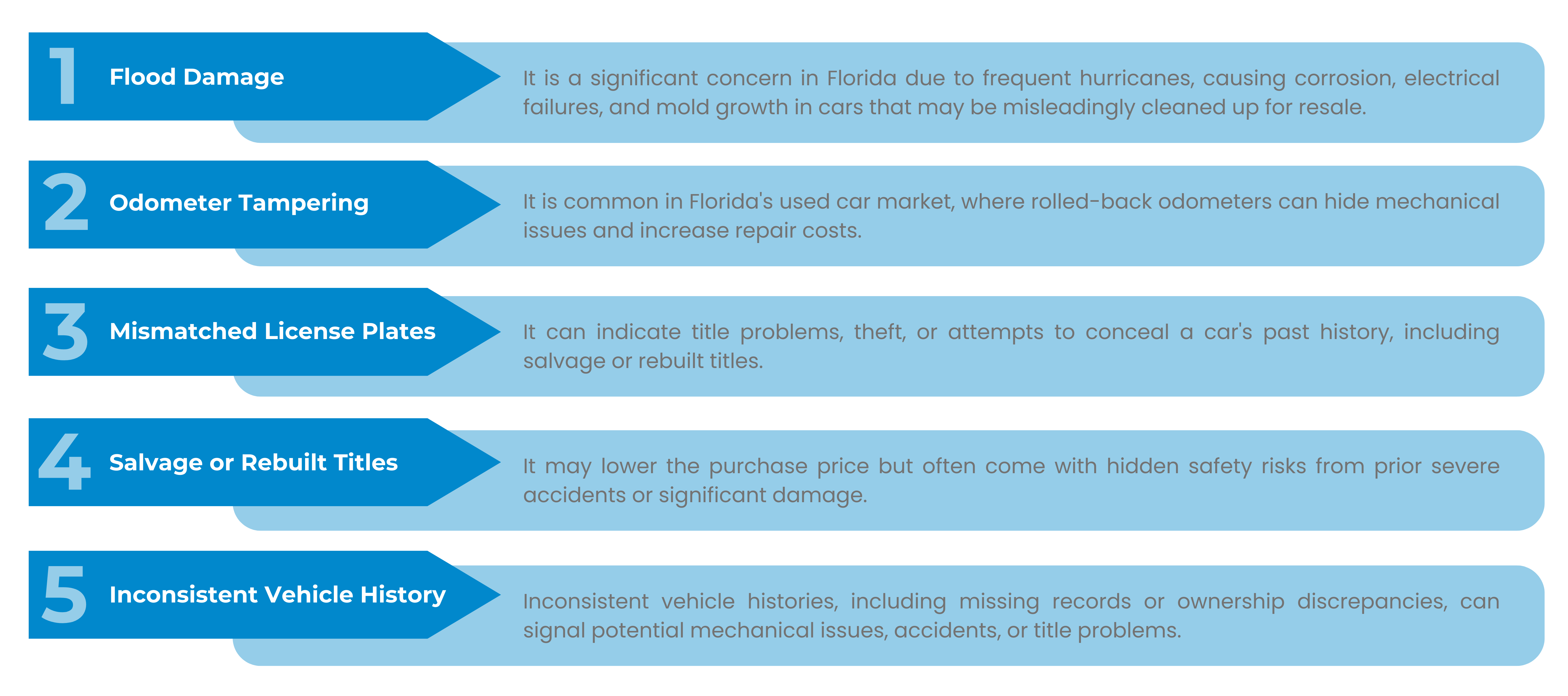
When shopping for a used car in Florida, you must know what to look for to avoid costly mistakes. With a little due diligence and tools like a Florida license plate lookup, you can uncover hidden issues. These hidden issues might otherwise slip through the cracks if not for the proper documentation provided by the tool.
Florida’s humidity and coastal proximity mean you should be vigilant for signs of rust or water damage on vehicles. They can significantly impact a vehicle’s longevity and even cost additional expenses for repairs.
Here are the top five red flags to watch for. At the end of this article, know how a license plate lookup free service can help you avoid pitfalls.

1. Flood Damage
Florida’s frequent hurricanes and heavy rains make flood-damaged cars a significant concern. Floodwater can cause issues like corrosion, electrical failures, and mold growth, which may not be apparent during test drives. These vehicles often end up in the secondhand market after receiving fraudulent title cleanups, misleading buyers about true conditions.
How to Spot It:
- A musty smell or visible mold under the carpet or seats.
- Rust or corrosion in unusual areas like door hinges or under the dashboard.
- Electrical components that don’t function properly.
- Water stains or discoloration on upholstery or seat belts.
- Silt or debris in hard-to-clean areas such as under the spare tire or in small crevices.
- Fogging inside headlight or taillight assemblies.
- Check vehicle history reports for flood-related titles or insurance claims.
How a Florida License Plate Lookup Can Help:
Using a license plate lookup Florida tool can help expose this. For instance, it can show if the car has a flood-induced salvage title or if it frequent flood-prone areas.
2. Odometer Tampering
Odometer fraud is another common issue in Florida’s used car market. A car with a rolled-back odometer might appear to have lower mileage, but it can mask significant wear and tear. This practice is illegal and can lead to costly repairs for unsuspecting buyers due to hidden mechanical problems.
How to Spot It:
- Check for inconsistencies in the mileage listed on service records and inspection reports.
- Look for excessive wear on the steering wheel, pedals, or seats that doesn’t match the claimed mileage.
- Inspect the odometer for misaligned or unevenly spaced numbers.
- Compare the mileage with the vehicle’s age and average usage—around 12,000-15,000 miles per year is typical.
- Use a vehicle history report to verify recorded mileages during title changes, inspections, and service visits.
How a License Plate Lookup Free Service Helps:
A car license plate lookup can reveal mileage discrepancies recorded during previous inspections or sales, protecting you from purchasing a vehicle with tampered odometer readings.
3. Mismatched License Plates
A car with mismatched or suspicious license plates could indicate title issues, theft, or illegal activity. Mismatched plates can result from attempts to conceal a vehicle’s history, such as salvaged or rebuilt titles, which may affect its safety and value.
How to Spot It:
- Cross-reference the vehicle’s history via a license plate lookup tool and VIN check to ensure no inconsistencies.
- Check that the plate aligns with the state’s registration details.
- Verify that the font, size, and design of the plate match the state’s current issued plates.
- Confirm the expiration date on the plate is accurate and matches the vehicle’s registration renewal status.
- Look for signs of tampering, such as altered or missing stickers or mismatched bolts.
- Check that the vehicle’s model year aligns with the plate’s design and registration format (some states update design annually).
How Florida License Plate Lookup Protects You:
Running a Florida license plates lookup can confirm if the plates belong to the vehicle. It can also reveal any associated legal issues, such as unpaid fines or liens. This lookup also helps potential buyers avoid buying a vehicle with hidden problems or unresolved legal matters. Hence, it is invaluable in protecting their investment and ensuring compliance with state regulations.
4. Salvage or Rebuilt Titles
Vehicles with salvage or rebuilt titles often come with a lower price tag. However, they can also carry hidden safety and reliability concerns. These cars may have been previously involved in severe accidents or suffered significant damage from floods, fires, and others. These catastrophic events, which could affect their structural integrity and performance.
How to Spot It:
- Check the title for “salvage” or “rebuilt” notations.
- Be wary of cars priced significantly below market value.
- Request a vehicle history report (e.g., NMVTIS) to verify the title status.
- Inspect for signs of major repairs or damage, such as mismatched paint or uneven panel gaps.
How a Car License Plate Lookup Helps:
A license plate lookup Florida can uncover the vehicle’s title history, letting you know if it has been previously declared a total loss.
5. Inconsistent Vehicle History
A car’s history should be straightforward, but vehicles with gaps in records or inconsistencies could indicate underlying problems. For example, missing service records could suggest neglect or hidden mechanical issues. Meanwhile, discrepancies could point to potential accidents or title issues.
How to Spot It:
- Look for incomplete service records or unexplained changes in vehicle data.
- Beware of cars without a documented maintenance history.
- Check if the car has undergone major repairs that aren’t reflected in the records.
- Investigate if there are discrepancies in the odometer readings or title status.
How a Florida License Plates Lookup Can Help:
This tool provides a comprehensive report of the vehicle’s past. Its content may feature sales history, accident reports, and registration details, helping you avoid surprises.
Case Studies of Fraud in Florida’s Used Car Market
Florida’s thriving used car market also attracts scammers looking to offload problem vehicles. For example:
- Flood-Damaged Fraud: After Hurricane Irma, thousands of water-damaged cars were cleaned up and resold without disclosure.
- Odometer Rollbacks: A Miami dealership faced lawsuits for selling cars with tampered odometers, costing unsuspecting buyers thousands in repairs.
- Title Washing: Vehicles with salvage titles were illegally retitled to hide their true history.
- Stranded Warranty Claims: Fraudulent claims by sellers promising warranties on vehicles without actual coverage.
- Fake Carfax Reports: Some sellers altered Carfax reports to show clear histories of vehicles with past accidents.
By using a license plate lookup free tool, you can spot these scams before they catch you off guard.
Protect Yourself with a Florida License Plates Lookup Tool
Don’t take unnecessary risks when buying a used car. Spot red flags with our Florida License Plates Lookup Tool, a reliable resource for uncovering hidden issues like flood damage, title discrepancies, and more.
For broader searches, perform a car plate lookup to ensure you’re making an informed purchase. Avoid hidden issues and drive away with peace of mind!